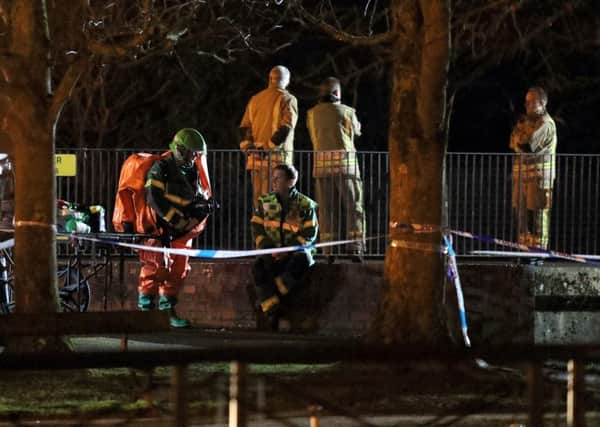Edward Spiers: On Russia, words must be backed with swift action


She avoided the trap of making allegations that could not be substantiated at the moment: “Either this was a direct act by the Russian state against our country or the Russian government has lost control of this potentially catastrophically damaging nerve agent and allowed it to get into the hands of others.”
Yet, in the absence of a credible response from Moscow, Mrs May is duty-bound to fulfil her promise that the Government will “conclude that this action amounts to an unlawful use of force by the Russian state against the United Kingdom”, and that “there can be no question of business as usual with Russia”.
Advertisement
Hide AdAdvertisement
Hide AdShe began with a statement yesterday promising the expulsion of 23 diplomats.
After the flaccid response to the murder of Alexander Litvinenko in November 2006, and the failure to investigate a range of suspicious deaths involving former Russians in Britain, the Government is under pressure to deliver.
Amber Rudd, the Home Secretary, has already promised to reopen the cases in up to four of these deaths.
As the British response is framed, it is clear that this is a challenge to international diplomacy and protocols governing chemical weapons.
Advertisement
Hide AdAdvertisement
Hide AdA demonstration of international support would be significant. Mrs May could seek a declaration of solidarity under Article 5 of the Nato Treaty, where an attack on one signatory is deemed an attack on all, and possibly an enhancement of the deterrent posture on Nato’s eastern flank, which currently relies on the tripwire of a 4,000-strong allied force. She might also seek an increase in EU sanctions against Russia, which would test Britain’s influence, or the lack of it, during the Brexit negotiations.
However, if the Government concludes that Russia once again poses a serious threat to the West, and the ‘rules-based international order’, albeit in a more inventive, calculating, and devious way than during the Cold War, Mrs May will need to raise the bar in how she responds financially, diplomatically, and militarily.
Financially, she will need more precise levers against Russian oligarchs, possibly a British version of the Magnitsky Act now under consideration.
This was American legislation, passed in 2012, after the death of Sergei Magnitsky in custody while he was investigating corruption.
Advertisement
Hide AdAdvertisement
Hide AdThe intention would be to punish specific Russian officials by freezing their assets and withholding visas from those suspected of human rights abuses.
Diplomatically, Britain needs to contest the claim that Russia destroyed its chemical weapons stockpile last year, in accordance with the Chemical Weapons Convention (CWC).
Although Russia secretly developed the Novichok nerve agents, and never disclosed their existence under the CWC Treaty (1997), the convention claims sweeping powers against ‘any chemical’ used to kill, incapacitate or harm.
If inspection by the Organisation for the Prevention of Chemical Weapons (OPCW) is deemed impractical, since Novichok agents are created out of “harmless” precursors and need not be stockpiled, the Foreign Office could still press for a full accounting of this programme.
Advertisement
Hide AdAdvertisement
Hide AdMilitarily, the UK has to learn lessons from our response to the deployment of Novichok (“newcomer” in Russian).
The UK cannot assume that any future chemical attacks will be only 12 kilometres from Porton Down, and so needs a rapid-reaction capability such as the Joint Chemical, Biological, Radiological and Nuclear Regiment, which was disbanded prematurely in 2011.
The Novichok nerve agent posed particular challenges in Salisbury, but Russia is deploying a full spectrum of threats: conventional and unconventional forces, propaganda, espionage and cyber warfare.
If not entirely cost-free (sanctions have had some effect on the Russian economy), Russia has not paid a significant price for actions that are calculated and usually deniable, if not very plausibly.
Advertisement
Hide AdAdvertisement
Hide AdUltimately the Government may decide that protests, sanctions, and financial penalties are not sufficient, and that it may be time for retaliation in the form of an offensive cyber attack, aimed at Kremlin networks, fake news outlets, and the websites of state-sponsored trolls (paid online commentators) and bots (automated pushers of content on social media).
Edward M. Spiers is Professor of Strategic Studies at the University of Leeds.